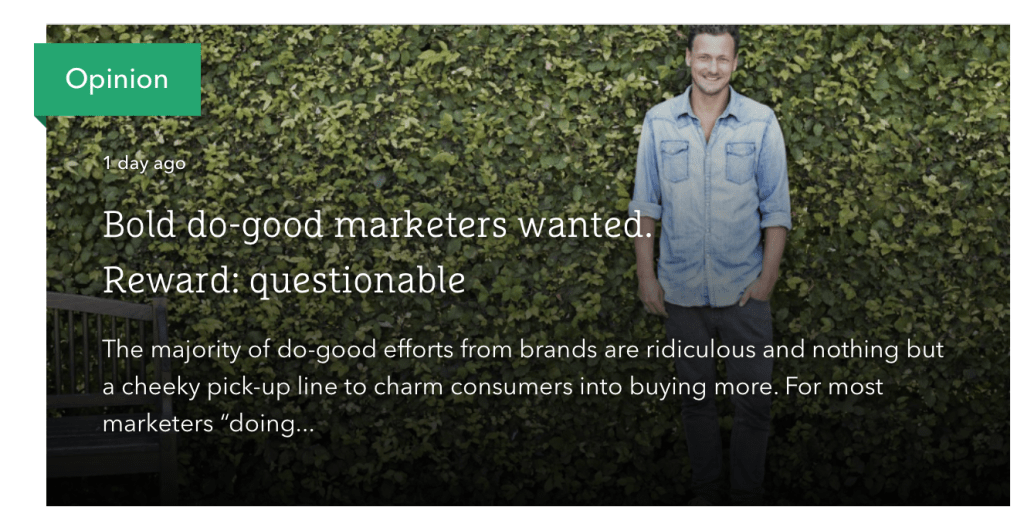Originally featured in The Drum.
The majority of do-good efforts from brands are ridiculous and nothing but a cheeky pick-up line to charm consumers into buying more. For most marketers “doing good” or “Goodvertising” is simply yet another buzzword in their branding vocabulary that’s as sincere and determined as some fast-food brands’ efforts against obesity. Marketing can keep talking about changing the world – or it can do something about it.
Brands are stuck with short-term thinking and why would it be any different when the average marketer is only in the hot seat for a few years? Recent figures by The Marketing Society show that the average tenure of today’s CMOs in the UK stands at just 18 months on average (in the US: 44 months), so maybe it’s no wonder that brands can seem confused after a continuous string of foster parents assert their own ideas on upbringing and care-giving.
Ignorant or naive?
I am embarrassed by our industry when I see the ignorance in our work. Consider Coca-Cola’s “Happiness Arcade” where some of the world’s poorest people in Pakistan were rewarded for recycling PET-bottles with a fun, arcade game. The campaign is a brilliant thought, but only ran for two weeks… what impact did it really have then? Or is it yet another flirtation with real change from adland? We’re blinded by our own hypocrisy. In research paid for by the UK Advertising Association, Deloitte found that when a pound is spent on advertising, it adds six to the United Kingdom’s GDP. This calculation is only based on a few positive metrics and discounts negative effects like health, societal and environmental damages. Doesn’t that sound just like advertising?
Outcry or outsmart?
We’re waving goodbye to an age of damage as we’re realising the negative effects of how we used to do business, and brands relying on shouting louder than their competitors rather than outsmarting them will soon be silent. If you want people to care about you, it’s about time you begin by making a real difference in their lives. It’s simply time to act – but do you have the stamina?
A sustainable brand is not built in one day. For Interface it’s been a long and tedious journey of 21 years, starting in 1994 with one person, founder Ray Anderson. Another do-good classic, Unilever, is still far from being a sustainable brand, but at least its efforts are beginning to pay-off, with CMO Keith Weed acknowledging that Unilever’s purposeful brands, “delivered half the growth and grew twice as fast”.
Lip service or walking the talk?
I don’t believe in purpose as it’s most often just gluing some do-good label on to an existing brand: “Shampoo, now with purpose”. If not integrated into the company’s mission and vision, purpose becomes an airplane with two cockpits or a moral compass nobody listens to as the course is already set.
H&M has adapted its vision from fashion at competitive prices to “Fashion and quality at the best price in a sustainable way.” It might be lip service (and what does “in a sustainable way” really mean?) but the mission will stand the test of time as H&M is beginning to walk the talk with initiatives like rewarding people for recycling garments, new design processes, more sustainable alternatives like its Conscious collection, the Global Change Award and the Conscious Foundation.
To succeed as a CMO today, you’ll have to step out of your branding ivory tower, kick down the departmental silos and get people to work together towards one shared goal or risk blowing a branding trumpet that’s out of tune. That’s not done in your average 18-month tenure. The current agency-client model is not answering the call for change either, as it’s a hired gun relationship rather than a shared fight. Solving real issues is not completed by hurdling from brief to brief.
Customers or communities?
The centralised, hierarchical, command and control, linear-thinking marketing plan is becoming obsolete. The traits needed as a marketer today are built on openness, collaboration, decentralisation, passion and communities, but foremost by empowering people. Starbucks used to be a textbook example of a purposeful company, but today its model is being challenged by the likes of Wheelys, a chain of organic bicycle cafes, enabling people (ALL people) to start their own businesses. Wheelys empowers because it is run by what it describes as “a person with a heart and dreams” – surely its customers can feel the passion, as it’s now present in 45 countries.
Why stick your neck out for doing good?
It’s no easy job. Last summer I was on a panel at a Fortune 500 company attended by its top-level marketers to discuss the brand’s sustainable ambitions. A young CMO rightfully pinpointed the dilemma. Why should she stick her neck out for doing good, when she might only be in her current position another year or so and then she’d probably be working for another brand inside the multinational, or maybe she’d leave to work for another company altogether? By the end of the day, her sales performance will be rated higher than any sustainability metrics. We’re systemically stuck with short-termism.
People are increasingly seeing brands as part of the problem rather than the solution – and there simply aren’t any quick fixes. The rewards for doing good are questionable, just as the famous Shackleton ad from the turn of the century read: “Men wanted for hazardous journey. Low wages, bitter cold, long hours of complete darkness. Safe return doubtful. Honour and recognition in event of success.” Do you dare to join the expedition towards a new and better marketing?

